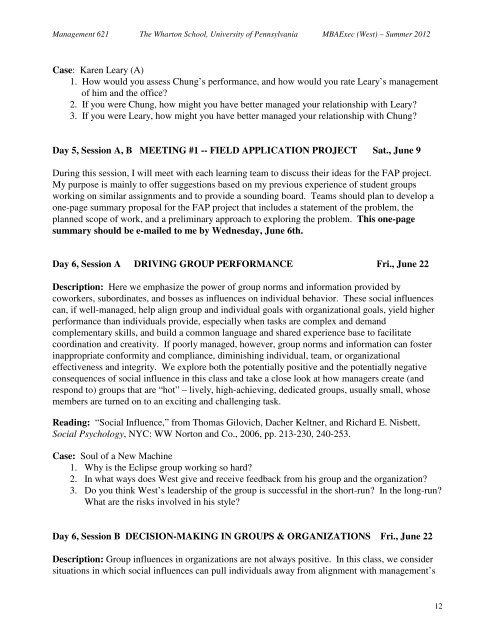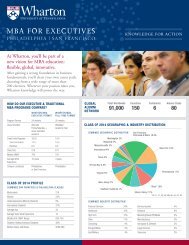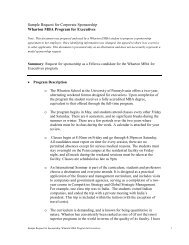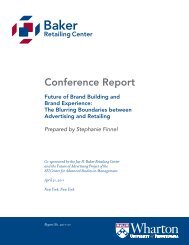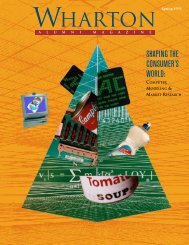version Date: April - The Wharton School of the University of ...
version Date: April - The Wharton School of the University of ...
version Date: April - The Wharton School of the University of ...
You also want an ePaper? Increase the reach of your titles
YUMPU automatically turns print PDFs into web optimized ePapers that Google loves.
Management 621 <strong>The</strong> <strong>Wharton</strong> <strong>School</strong>, <strong>University</strong> <strong>of</strong> Pennsylvania MBAExec (West) – Summer 2012<br />
Case: Karen Leary (A)<br />
1. How would you assess Chung’s performance, and how would you rate Leary’s management<br />
<strong>of</strong> him and <strong>the</strong> <strong>of</strong>fice<br />
2. If you were Chung, how might you have better managed your relationship with Leary<br />
3. If you were Leary, how might you have better managed your relationship with Chung<br />
Day 5, Session A, B MEETING #1 -- FIELD APPLICATION PROJECT Sat., June 9<br />
During this session, I will meet with each learning team to discuss <strong>the</strong>ir ideas for <strong>the</strong> FAP project.<br />
My purpose is mainly to <strong>of</strong>fer suggestions based on my previous experience <strong>of</strong> student groups<br />
working on similar assignments and to provide a sounding board. Teams should plan to develop a<br />
one-page summary proposal for <strong>the</strong> FAP project that includes a statement <strong>of</strong> <strong>the</strong> problem, <strong>the</strong><br />
planned scope <strong>of</strong> work, and a preliminary approach to exploring <strong>the</strong> problem. This one-page<br />
summary should be e-mailed to me by Wednesday, June 6th.<br />
Day 6, Session A DRIVING GROUP PERFORMANCE Fri., June 22<br />
Description: Here we emphasize <strong>the</strong> power <strong>of</strong> group norms and information provided by<br />
coworkers, subordinates, and bosses as influences on individual behavior. <strong>The</strong>se social influences<br />
can, if well-managed, help align group and individual goals with organizational goals, yield higher<br />
performance than individuals provide, especially when tasks are complex and demand<br />
complementary skills, and build a common language and shared experience base to facilitate<br />
coordination and creativity. If poorly managed, however, group norms and information can foster<br />
inappropriate conformity and compliance, diminishing individual, team, or organizational<br />
effectiveness and integrity. We explore both <strong>the</strong> potentially positive and <strong>the</strong> potentially negative<br />
consequences <strong>of</strong> social influence in this class and take a close look at how managers create (and<br />
respond to) groups that are “hot” – lively, high-achieving, dedicated groups, usually small, whose<br />
members are turned on to an exciting and challenging task.<br />
Reading: “Social Influence,” from Thomas Gilovich, Dacher Keltner, and Richard E. Nisbett,<br />
Social Psychology, NYC: WW Norton and Co., 2006, pp. 213-230, 240-253.<br />
Case: Soul <strong>of</strong> a New Machine<br />
1. Why is <strong>the</strong> Eclipse group working so hard<br />
2. In what ways does West give and receive feedback from his group and <strong>the</strong> organization<br />
3. Do you think West’s leadership <strong>of</strong> <strong>the</strong> group is successful in <strong>the</strong> short-run In <strong>the</strong> long-run<br />
What are <strong>the</strong> risks involved in his style<br />
Day 6, Session B DECISION-MAKING IN GROUPS & ORGANIZATIONS Fri., June 22<br />
Description: Group influences in organizations are not always positive. In this class, we consider<br />
situations in which social influences can pull individuals away from alignment with management’s<br />
12


